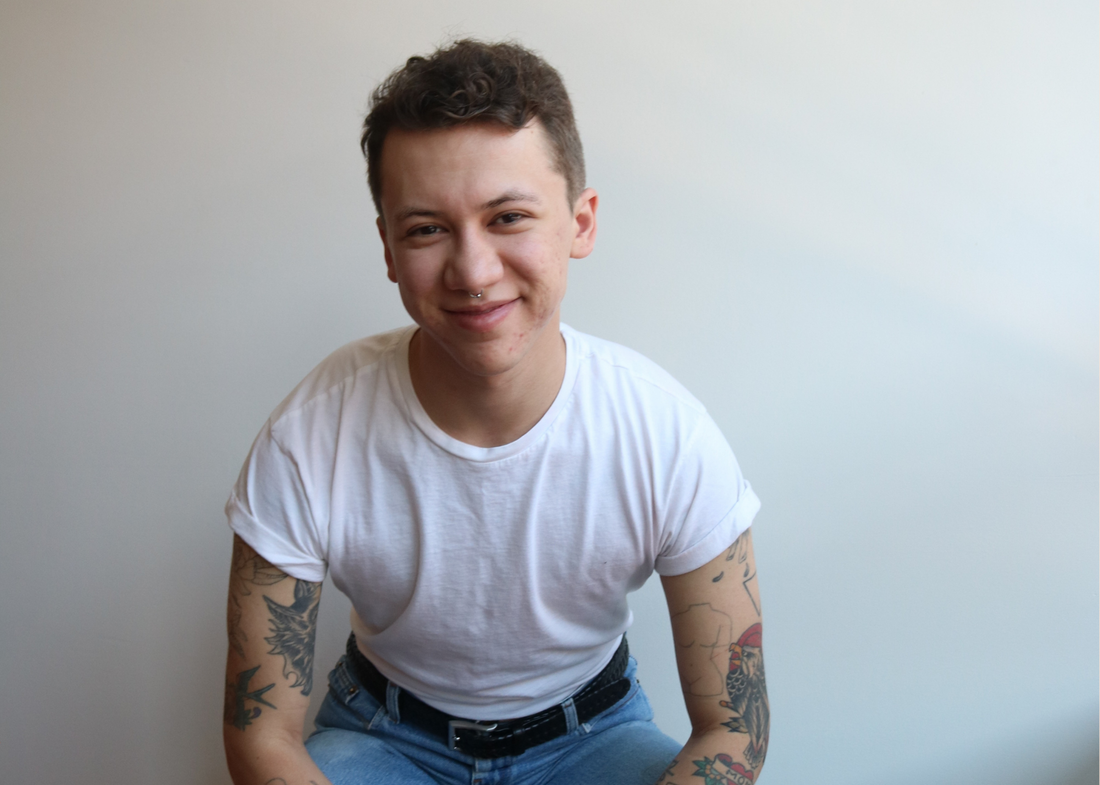
Advocating for My Manhood
Share
words by Clark Hamel (he/him)
@arm_and_hamel
Clark Hamel and our CEO Lindsay Wynn discuss what gender neutral language looks like, why we need to use inclusive language when talking about bodies, and the harm it can cause when we don't. Join us.
Something I don’t talk much about, as a transgender man, is the fact that I usually like my vulva. There are certainly times I don’t, ways I don’t, and I have a complicated relationship with it…but I’ve never wished it gone completely, nor have I ever felt as though it didn’t belong as a part of my body.
What complicated my relationship with my vulva more so than my transness is my tendency for infections. Growing up, I had quite a few vaginal health problems, and they’ve continued as an adult. Chronic yeast infections, UTIs, bacterial vaginosis (BV). I’ve even had HPV (despite being vaccinated). I have an auto-immune disorder, which has made me more prone to them. I also consider myself to be particularly adept at advocating for myself with doctors. I’ve dealt with them very closely and frequently for over a decade, and going to the doctor, for most of my life, was actually a fairly reassuring experience.
When I came out as a transgender man, I learned to advocate for my medical needs even more, and in a different way. But needing to feel affirmed and receiving proper care became a serious balancing act a few years after I came out when I ended up in the ER with the worst abdominal pain I’d ever experienced.
In the emergency room, I made it clear that that I am a transgender man; I was so worried about being misgendered. That was my priority, while keeled over in pain. They ran tests and found nothing wrong — not even a gas bubble — so I went home the next morning with nothing but an ER bill to take care of.
Feeling defeated and confused, I scheduled an appointment with my primary care doctor. I wanted to let her know what I was experiencing. I was still in pain but trusting that somehow, the doctors were right: nothing was wrong. They had to be! Who was I to question their knowledge, their competence, the accuracy of their tests?
The first question my doctor asked me when I came in was if I had received an ultrasound that night. I thought back…no, I had not. She shook her head and said she would order one, and that I should get it done that day if I could. The doctors in the ER had viewed and treated me as a man, but to the point of neglecting the kind of man I am: one with a vulva, a vagina, a uterus, and ovaries.
I got the ultrasound, and they found cystic fluid. A lot of it. The pain I was experiencing when I brought myself to the ER was an ovarian cyst ready to burst. It could have been caught in time and extracted, but instead it burst while I was probably stuck in a CT scan machine.
At the time, I felt like advocating on behalf of my transness had interrupted my medical care. When I did research on ovarian cysts later, every site had the word, glaringly and repeatedly: WOMAN.
I had always enjoyed doctors, the experience of being taken care of and the problem-solving nature of a diagnosis. But for the first time in my life, I began to wonder: will doctors be able to reconcile all parts of who I am?
I had always enjoyed doctors, the experience of being taken care of and the problem-solving nature of a diagnosis, which I know is a very privileged experience. But for the first time in my life, I faced that privilege and I began to wonder: will doctors be able to reconcile all parts of who I am?
About two years later, I experienced signs of a yeast infection. I was itchy, a little red. It was my first in a long time; I’m not sure if my first few years on Hormone Therapy staved them off, or if it was something else entirely, but it felt like my vagina was mocking me, waving, “Hello! Did you forget about me?”
I tried to get in touch with my doctor, but she couldn’t see me for two weeks. I did not feel comfortable using an over the counter suppository, so I waited. When I finally got to see her, she took one look and was visibly shocked.
I was not just itchy; apparently I had severe fissures, cracks in my skin, and large red patches of inflamed and angry skin. She thought that, given my history of auto-immune disease, this was a psoriatic rash that should be looked at by my rheumatologist.
So I scheduled an appointment and a week or so later I saw my rheumatologist. She said it did not look auto-immune related and that I should see a dermatologist. As I headed to my third doctor in two months, I felt angry and confused. Why couldn’t anyone figure this out? And a new feeling, a feeling that I tried to ignore — a hatred for my vulva, a hatred that it didn’t deserve.
When the dermatologist took a look, he said it was a rash from a mixture of sweat and dryness that had escalated because it had not been taken care of sooner. I felt so stupid — all this for vaginal dryness? It couldn’t be.
He gave me a cream and sent me on my way. I used the cream, but my symptoms only got worse. I finally scheduled an appointment with my fourth doctor in four months. Four months of this pain, and I took a trans man’s risk: I saw a gynecologist.
I explained my saga to her; she sat back in her chair and thought. Then she asked if I had been tested for common vaginal infections. I thought back to my three other doctors, who had all just taken a look and sent me somewhere else. I said no. She told me what she thought: untested, untreated, and highly escalated Bacterial Vaginosis. So she ordered the test.
And she was right. Untreated for nearly five months, the BV had spread and worsened, wrecking my body and taking my brain and heart along for the ride. I took two courses of antibiotics, and started ritually using Momotaro Apotheca’s Salve on all the painful parts.
My symptoms soothed. The itching stopped. The redness faded. The cracks healed. I’d been shuffled around for so long, so many assumptions made, that no one thought to test me for the most basic of vaginal infections. I had a follow up with the gynecologist and she told me that next time, I have to ask for what I think I need.
I had thought that advocating for my gender was interrupting my medical care. But it’s the medical system itself that interrupts my care.
About a year later I started to experience those same symptoms from before. Knowing what to ask for, but not able to see my doctor, I turned to the internet. I found a website that could send me medication. I took a breath, happy to get relief soon.
The next morning I woke up to an email from the company website. It said that because I had listed myself as male, I was no longer eligible, and my order had been cancelled. Without even thinking, I had clicked “male” in their gender dropdown list. Why wouldn’t I have?
Thinking back to my last two difficult medical situations, I knew what I had to do. I wrote an angry email.
When I got a response, it only made me more upset. They used the word that negates, the word that invalidates. The word “if.”
We’re sorry if you feel as though you were discriminated against.
They reprocessed my order — without apologizing — and I received my medication a few days later in the mail. I got what I needed. But the fact that it took so much effort was infuriating.
Vaginal care is difficult enough to access. According to a doctor, the only options for a yeast infection are an over-the-counter, up to eight days vaginal suppository (that usually leaks out of you unpleasantly), or one little pill that requires a prescription. How are those the only options? And on top of that, as a trans man, my options were to feel dysphoric or be discriminated against. How are those even options?
I’ve found many ways to take care of my body. Holistic and natural ways. Emotional ways. I’ve learned to ask for what I need. I advocate for all parts of myself. I'd rather get what I need with trouble along the way than have parts of my body and my life be neglected and forgotten.
I had thought that advocating for my gender was interrupting my medical care. But it’s the medical system itself that interrupts my care; most doctors (or at least all of them that I encountered) do not know enough about my body, or my identity to care for me properly.
The way in which wellness companies, doctors offices, and medical professionals speak about their services, the language they use, the way they treat you, or even the idea of you — these are the things which help me decide whether or not I will be safe with them. When I see the word “woman” I don’t feel like it — their products, or their care — is meant for me. I am not a woman. But my vagina needs just as much TLC as any other.
Related Reading
The Marginalization of Menstruation: What is the Tampon Tax & Period Poverty
Unpacking the Insidious Irony of the Sexual Wellness Industry's Whitewashing Problem
Facing Misdiagnoses: BIPOCs & Trans Folks Take Sexual Health Into Their Own Hands
LGBTQIA + Z the Bug Interview with trans model Z Walsh (he/him) @zthebug
How to Be A Better Ally for All Your LGBTQIA Friends
Meet the Author


